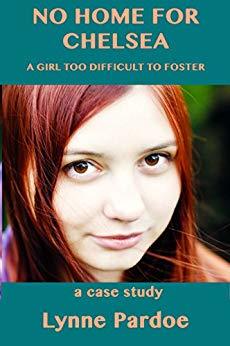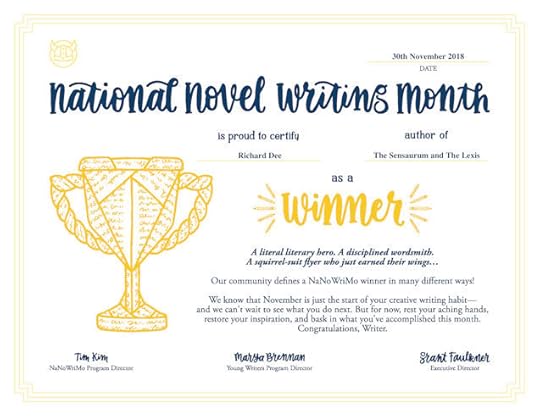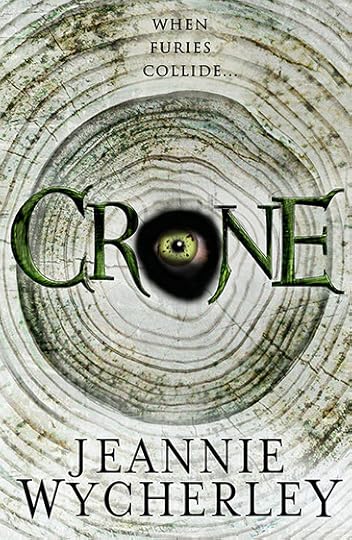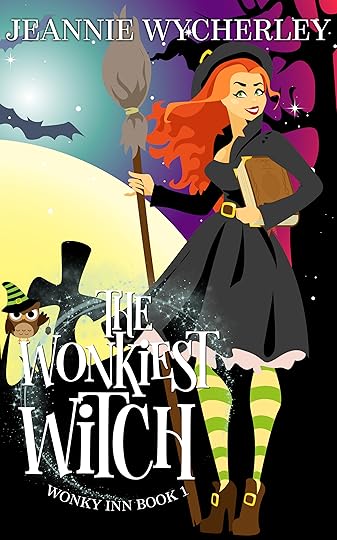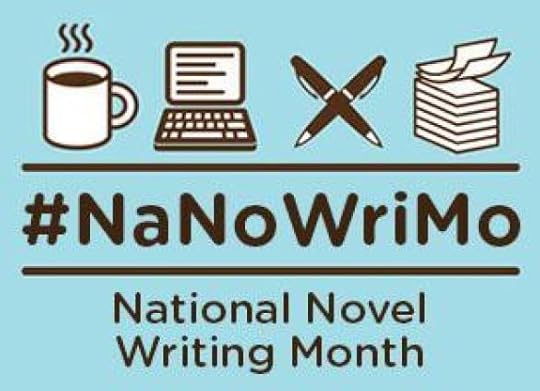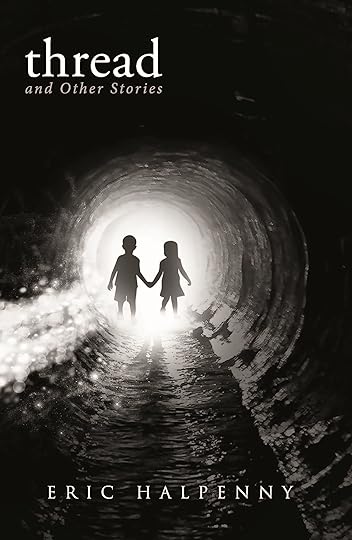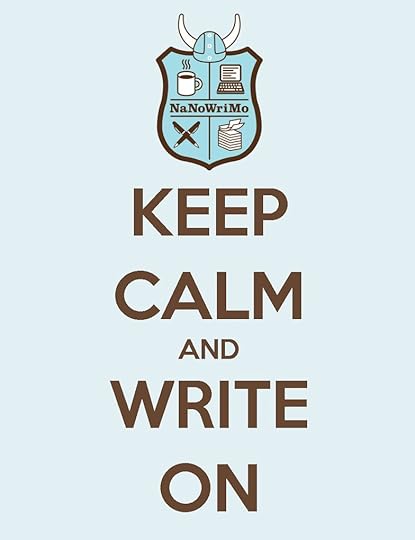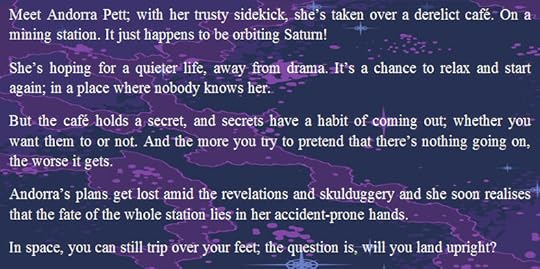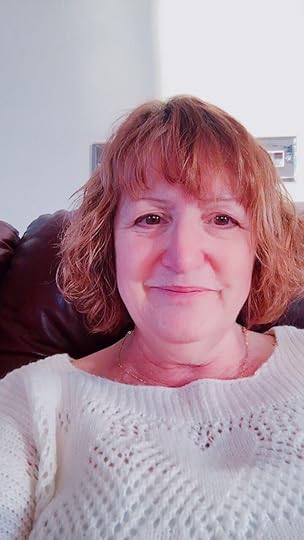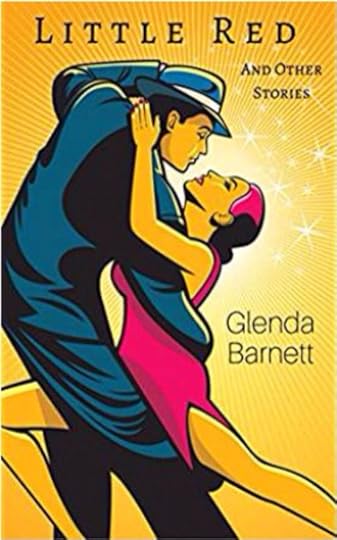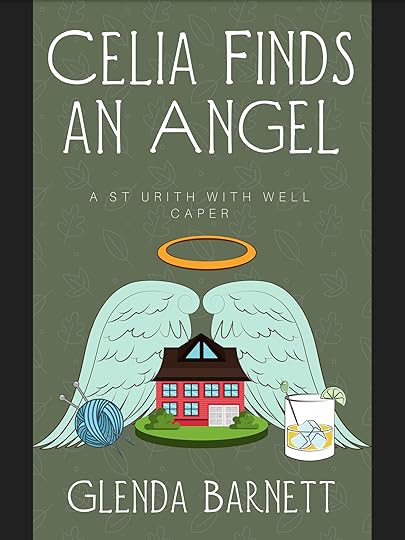Richard Dee's Blog, page 85
December 5, 2018
The Indie Showcase presents, Lynne Pardoe
Over to you, Lynne.
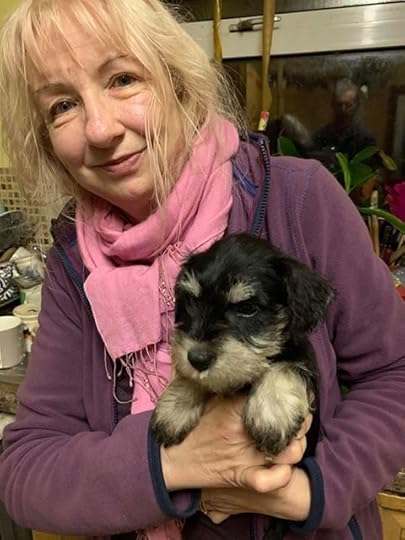 It occurred to me that writing the sort of social work fiction that I do, involves writing a sort of fantasy world, a world in which few people go, one that is outside the realms of most people’s daily lives. How can that be? I hear you ask.
It occurred to me that writing the sort of social work fiction that I do, involves writing a sort of fantasy world, a world in which few people go, one that is outside the realms of most people’s daily lives. How can that be? I hear you ask.
As a social worker, especially in those cases where the child is safe at home but there is some problem that is stopping the carers doing their best, you will just have a short time to figure out how best to help them. You ‘feel’ your way into someone’s inner life, thinking through and testing ideas until you get something that works. You need to be sure to get to the right reason for someone’s problems, and life being life, people don’t just come out and say it for a whole myriad of reasons. But that doesn’t make for good reading so you have to break down what it is you ’re actually doing. It’s a glimpse into someone’s inner world.
Mostly you’re interpreting small gestures, a frown, the tremble of a lip, frozen facial expressions at the mention of an abuser’s name for example. Sometimes the clue’s are bigger. Sitting room curtains closed all day suggest someone is depressed, perhaps fuelled by a subconscious desire to shut the world out. Episodes of a anger could be triggered by lack of self-esteem, maybe the shouter feels so insignificant the only way they believe they can make their words count is by shouting louder and swearing more.
There are a myriad of ways you can assist as a social worker. From simply setting the scene for a quieter style of interview and listening, really actively listening, to helping someone put distance, emotionally and physically, between themselves and others, maybe someone who has hurt them, or arranging treatment for depression and a whole wealth of other ways.
Social work will involve meeting some of the weirdest, wackiest people, those that are way outside most people’s social zone, like the chap who turned up at a complete strangers to do a small job for them and left his daughter there while he sailed his boat abroad. Or the woman who was convinced she was a re-incarnated pop star and frequently bought the matter up at school events. Social workers have to understand them. Readers have to understand them. It’s important to build a rapport with them. And as a social work author, you need to guide people to do that. You might be only in someone’s life a short time, but it could be the most important time in their life.
All that very much is a fantasy world when you start. You have to create different hypothesis and test them out, feeling your way gently into someone’s inner world until you find a way forward that works. You might not be able to visually see what you’re dealing with, but it’s there nonetheless, and as a social work writer you have to be able to create that world and help people see exactly what it looks like, what use is it, and how can you control it. It all has to make sense; to add up, so the reader comes away with a sense of ‘I understand that,’ just as you do in any sort of fiction.
One of these days I’m going to write some fantasy fiction, not because social work is depressing (it’s not, it’s probably the most rewarding thing you can do) but just because it’s so different, but until then I’ll stick with reading Richard’s, the world of writing is just so much fun!
Links
Website: www.lynnepardoe.com
Facebook: https://www.facebook.com/lynnepardoeauthor/
Twitter:https://twitter.com/LPsocialwork
Amazon Author page: https://www.amazon.co.uk/Lynne-Pardoe/e/B00PT6JYX4
~~~~
Thanks, Lynne for a great post. I hope you all enjoyed the insight into Lynne’s world. I have to admit to the greatest admiration for people who work in that field and any caring profession.
While you’re here, why not have a look around the site? There are FREE things and a whole lot more, just follow the links at the top of the page.
If you want to be featured in a future Showcase, where you can write about whatever (within reason) you want, then please let me know. Use the comment box below and I’ll get back to you.
You can catch up on previous Showcase posts by clicking HERE
Don’t miss next Thursdays Showcase post, and my musings every Monday.
Have a great week,
Richard.
The post The Indie Showcase presents, Lynne Pardoe appeared first on Welcome to my Worlds..
December 2, 2018
A New Beginning
The Carnival is over, as the song once said. In this case, I’m referring to NaNoWriMo, which finished last Friday. Do you remember that time, at the end of an exam, when you were told ‘stop writing’? I never actually had to, I’d always finished and was looking out of the window in panic long before that point. I tell you that, not to show how hopelessly unprepared I was, or how I was so clever and such a fast writer; but because it actually happened to me this time.
I couldn’t finish my NaNo project this year. I wrote just under 85,000 words but the story is still going strong.
I had to stop, if I hadn’t, I reckon I would still be going now. As it is, I think I’ve written the beginning of a sequel in there as well.
Jackson has lived in the Makewright Orphanage since his parents were killed in an accident. Now, he is selected to join a band of agents under the control of Sir Mortimer Langdon, investigating the murkier side of life in Norlandia.
In this tale, Jackson is thrust into action against a man who would use perverted science to take over the world. Using the latest fantastic creations of Steampunk technology Jackson and his friends must thwart The Master of Automata.
Here’s my certificate to prove it, now I’ve decided to put the story away for a couple of months before I return and start to edit it.
It means that I have to bite the bullet and do what I’ve been putting off forever. The ‘M’ word.
If anyone had said, when I was at an event, or a workshop, ‘hands up if you like Marketing’, you won’t have found my hand raised. In five years of trying to market my work, I think I’ve tried just about every method that there is. I have to admit, at first, I did hardly any, I just assumed that sales would come as my book was somehow spotted. Of course, it never happened.
I had another disadvantage to overcome. I’ve always worked in a place where I had no need to sell my services. Consequently, I had no real idea how to begin to advertise, so in time-honoured fashion, I did nothing and waited for readers to ‘discover’ me. Guess what, I’m still waiting.
I never wanted to shout “buy my Book” anyway. I always hated the sales methods of the cold caller or junk mailer. To balance that out; in the age of social media, I knew that I needed to stand out, create a buzz and make people interested in ME before I tried to sell them anything. And I also knew (even if I didn’t like to admit it), that my reservations counted for nothing. I wasn’t selling to me, with all my opinions and thoughts about what I liked and what I didn’t. I was selling to everyone else.
Just when you might think that I’d got it cracked, that was where my shyness came to the fore. I found that I hated putting anything much about myself online, for fear that it would be boring, or appear boastful. And I disliked commenting, people never seemed to ‘get’ my sense of humour and I found starting or following threads hard. I had experiences with trolls and was on the receiving end of the less pleasant side of the internet as well, which made me even more cautious in how I acted and reacted online.
My marketing strategy, such as it was, turned into a game of trying what had worked for others, I became addicted to trying all the methods I saw others gain success with. Things like paid advertising, creating an email list with a free giveaway, posting things about my life, where I had been, what I was cooking or eating. But although I got a few likes and comments, I still wasn’t selling anything much. It didn’t seem to work for me as it did for them. And I found that, as time went on, the number of subscribers that I had on my mailing list, supposedly the holy grail of marketing, fell until it was hardly worth my while creating a newsletter.
Next, I changed my book’s description and keywords, again there was a little success but not as much as I had hoped. I wrote and published more and more, adding it to what was now a bulging portfolio. Subconsciously, I think that I hoped that, by writing, I could convince myself that I was too busy and could ignore marketing. The reviews that I did get (and was allowed to keep), were promising enough to tell me that I was writing reasonable stories, some people liked them. It was enough to keep me going.
To be honest, I think that I’ve now reached the point where I need a fresh pair of eyes, and a revamp of the whole, sprawling mess that 4Star Scifi has become. So, as a project to occupy me over the next few months, or at last until March when Life and other Dreams comes out, I’m engaging the services of as many experts as I can find, examining each aspect of my operation and dragging it, kicking and screaming into a new way of doing things. That means looking at all the things I do, things like my free offerings, blog and posts. And the things that I’ve thought of doing, a possible box-set, turning my online resources into a textbook, advertising and all the other bits and pieces.
I will be posting about what I find I’ve been doing wrong (I suspect the answer will be most of it!), and the new things that I’m trying to get myself noticed without being too pushy, or spending too much, at least until I’m sure that I can cover the costs with sales. I have a whole list of things to try; without the pressure of writing, I can give them my full attention. And a couple of carefully selected books, from authors who have been successful, to get me going.
The first problem is knowing where to start. Do I optimise my website, start finding new keywords and revise my categories? Do I ramp up my social media, make more YouTube videos and advertising posts? Do I rewrite my author page, my book descriptions? Does my pricing need attention? Should I pay for people to do things or do it myself, free except for the time spent? Do I have the skills required?
There we have the reason for me putting it off, I can never decide where to start, or what order to do things in.
The next problem is this; there seem to be so many different ways to do the same thing. Every ‘expert’ is telling me that their way is the only one? There is so much information to digest.
That’s enough for this week, if I keep typing this, I will never get any marketing done!
New material can take a back seat for a while. My unfinished work can remain unfinished because if I don’t finally get to grips with telling people that I exist and that according to some, I write a pretty good story, writing more and more novels and blog posts that nobody will read is all a bit pointless.
Stay tuned for my reports as I progress and wish me luck, the Showcase returns on Thursday, with another great author.
While you’re here, please check out my portfolio and free offerings by clicking the links at the top of the page. If you have a minute, tell me about your successful marketing methods in the comments below.
The post A New Beginning appeared first on Welcome to my Worlds..
November 28, 2018
The Indie Showcase presents, Jeannie Wycherley
This week, its the turn of another author from Devon, Jeannie Wycherley.
Loving the landscape: how living somewhere between the forest and the sea has shaped my writing
Seven years ago I found myself in a bad way. Severe anxiety, exacerbated by workplace stress, with depression to boot. I had a long commute—in the Midlands—to and from work, and was sleeping for less than four hours a night—some nights not at all. I kept myself awake and compos mentis during the day with showers and caffeine, and the pure acid burn of noradrenaline.
Then horror of horrors, it was decided by the powers-that-be that everyone on my grade at work would need to reapply for their jobs. I didn’t get mine. I thought my world had ended. My line manager offered me a retrograde step back, or redundancy. I remember feeling absolutely humiliated, but two thoughts rang clear as a bell in my sleep-deprived brain.
One: I wanted to spend more time with my dogs.
Two: I wanted to go home.
Looking back I probably should have been considering other things (like what my husband would say about it all and how we would manage our mortgage) but the urge to be free and in an environment that would nurture my soul was something I appeared to be screaming for.
Within nine months my husband had taken early retirement, our house had sold, and we were heading down the M5 to a new—much simpler—life. I say simple because house prices in parts of the Midlands are not commensurate with what you’ll find in the south-west and we ended up renting. At the whim of landlords, we had to move a few times—not easy with three dogs.
But perhaps that was the greatest gift of all.
I originate from South Devon. My Mum’s family are from Paignton, Brixham and Stoke Gabriel. I went to school in Newton Abbott. But for a variety of reasons, my husband and I chose to settle in East Devon (AONB). It is stunningly beautiful, and that’s a large part of why the landscape here has directly impacted on my writing. So much so, in fact, that one reader contacted me to say that they see the forest in Crone as an entire character in its own right.
Until returning to Devon most of my writing was angry and dark. You can read one of my short stories Managing Murder in my collection, Deadly Encounters, that explores my feelings about redundancy *she titters grimly*. I had one full-length novel (still unpublished) that explored the themes of greed, isolation, and loneliness in the city, and it perfectly sums up where I was at that time.
But arriving in my little backwater, gone were the huge Victorian edifices and wide boulevards, the jostling of thousands of people desperate to fit in and yet be noticed at the same time, the ring roads and bottlenecks, bus lanes and trams, slow-moving traffic, the rush rush rush of the 8-6 (because no-one who had the managers I had, ever got away with a 9-5).
In their place were slow moving people, tiny cottages, country lanes, tractors and trees.
And suddenly the apocalyptic literary landscape of my mind changed. I had time. I had space. Now I could give myself permission to breathe. The forest nurtured me, with the abundance of soft greens and browns, and its good clean air, and at the same time, it began to inspire me. The tangled undergrowth, the twisted roots, the gnarled branches, the sheer size of some of the older oak trees. There is something incredibly human and ancient about trees—they zing with life, they have stories, they are sentinels.
So imagine—you’re gazing into the undergrowth one day, perhaps the light is failing. It’s been an overcast day anyhow. You thought you heard a squirrel or something moving, but not at ground level. So you shift your gaze, you peer between the knotted branches, among leaves that tremble ever so slightly. At first, you think your eyes are deceiving you; that this is some trick of the light, but as you refocus, you see her. An old woman, skin the colour of aged parchment, hooded eyes, viscera as black as ink.
Crone grew directly from the East Devon landscape. From the woods and forests around Ottery St Mary (Abbotts Cromleigh in the novel) and in the Blackdown Hills (which is where I wrote most of it). I sometimes flip through my copy, and read extracts, wondering where the language came from, but truthfully? I was so immersed in the landscape that the words configured themselves and I was simply a conduit. If I found myself with writer’s block, I’d venture out for a walk, and stare at the root patterns of trees, or just gaze into a tangle of bramble. It worked every time.
CRONE – Jeannie Wycherley – 2017
The first 500 words
The cracking and snapping of dry bones reverberated through the stillness of the night. In the freezing air, at the very heart of the wood, in the slumped ruins of a long-forgotten dwelling, something dark began to manifest itself.
Little more than a mummified corpse, she unfolded her outer layer in a shower of dust and dry mould. Her skin, what remained of it, creaked like ancient leather and her flesh stretched taut over foul stringy innards. Then reaching, stretching, groaning, retching—she hauled herself upright. Once risen, she floated inches above the ground, while the mist—salty from the nearby sea—enveloped her like a pall and covered her foul nakedness.
She slipped out of her shack, and the wildlife in the undergrowth shrank from her black charisma, keeping their distance from her rancid stench, the stink of putrefaction.
In the treetops, caught out by her rapid manifestation, an owl blinked uneasily. Fearful, he observed her as she moved beneath him, then hopeful of evading her gaze he casually pivoted his head, pretended she was unseen and he was unseeing. But Aefre, even in her newly woken state, was both observant and deadly.
She was fast, lashed out at the owl, a missile of energy directed from her mind. His body exploded in a cloud of downy feathers. Her deformed claw-like fingers caught his remains as he fell from his perch, and she stuffed him into her mouth, whole. She chewed once, twice. Swallowed. A single line of blood dribbled from her chin, and the thinnest layer of fresh skin started to form a mouldering translucent veneer.
There was a halo of light to the east. Civilisation. For Aefre, the time was ripe. She was awake. It was time to bask in the thrill of the hunt. This time she would locate her sisters and join them in a merry dance of carnage.
First things first, however. She needed sustenance. She headed for town. She would find everything she needed there.
***
The boys tumbled out of the multiplex, blinking in the garish sodium lights of the car park, high on an adrenaline kick after enjoying the latest blockbuster. Max was grateful that James now had a driving licence and a car to go with it and they weren’t dependent on the non-existent bus service. It was hell being stuck in Abbotts Cromleigh with nothing to do.
Max was completing his A levels this year, and come September he would be off to University in a city where you didn’t need a car. Everything he needed would be on his doorstep. Live music venues, sporting facilities: Sheffield promised to be everything his small Devon home town couldn’t be.
He’d miss The Storykeeper though. Sheffield had bookshops, sure, but The Storykeeper was something special. It was housed in a higgledy-piggledy Elizabethan structure that had been added to time and again over the years, and thus appeared to stretch back and up endlessly. Shelves meandered like mysterious rivers throughout the building
~~~~
More recently I published Beyond the Veil. I used the fictional name of Durscombe for the seaside town, but the landscape is easily recognisable as Sidmouth to anyone who knows it. For literary purposes I changed Connaught Gardens to the Victorian Garden Cemetery, and I put a huge thatched inn on the promenade (I borrowed The Blue Ball Inn from Sidford) but otherwise the map of the town in my head is Sidmouth. Beyond the Veil teams a sceptical detective investigating a murder, with a woman who claims to be a witch. She makes matters worse. The use of the town is highly effective. Who knew Sidmouth could be so spooky?
Extract from Beyond the Veil – Jeannie Wycherley 2018
The Victoria Gardens Cemetery, built during the mid-1860s on the site of the old Victoria Gardens in order to catch the overspill from St Michael’s Church in Durscombe, was a sprawling homage to the celebration of death. In the oldest part of the cemetery, tombstones of all shapes and sizes, once neatly laid out with typical Victorian precision, had partially sunk into the sandy earth. They huddled together under the shelter of trees, or nestled higgledy-piggledy and forgotten among tangled undergrowth. Moss and lichen clung to stone surfaces, obliterating names, dates, and histories.
Heidi limped around the newer area of the cemetery, with half a mind to search for her aunt’s gravestone. Here, well away from the cliffs, the grass was neatly manicured, and bunches of flowers and wreathes, many of them bright and fresh, paid colourful respect to those more recently departed.
As a teenager, Heidi’s first love had been photography, and she was lured to the more sombre and antiquated part of the gardens, with its elaborate tombs and mausoleums. She hadn’t expected to find such a wonderful treasure trove of Victoriana here in East Devon, but here it was, and sadly Heidi didn’t have a decent camera on her.
She took a few shots here and there with her mobile, determined to upload them to her laptop once she returned home later. She didn’t imagine the images would require much fiddling to achieve atmosphere and mystery.
The morning started out sunny and mild, but by lunchtime the weather had changed. A sea mist rolled in and the drizzle became incessant. Now the trees, many still clinging onto their leaves, were heavy with moisture. This far south, the summer was lingering, loath to let go completely. While in Birmingham, Heidi imagined winter would have already extended its death grip.
She snapped away, taking shots of spiders’ webs glistening with tiny beads of water among the bushes and brambles, looking for all the world like nature’s most spectacular diamonds. Heidi crouched, her leg painful, trying to create interesting angles.
A soft sound behind her made her jump up, startled. She hadn’t seen a soul since arriving at the cemetery, not even a groundskeeper, even though she’d been here for an hour at least. With difficulty, she righted herself and turned about. A young woman stood approximately six metres away, regarding her with open curiosity.
A little younger than Heidi, the other woman appeared to be mid-twenties at most. She wore her straight hair loose, and it was so black, that Heidi reasoned it could only have been dyed that colour. This contrasted starkly with her pale face, painted white for maximum ghostly effect. She was dressed head to toe in black too: a long black maxi dress, with a lace ruffle at the hem, and a three-quarter length black coat in velveteen. Tough lace-up boots with thick soles and a two-inch heel finished off her wardrobe. Her eye make-up was smoky and exquisitely finished, and even her nails were painted black. She was adorned with silver jewellery, around her neck and wrists, on her fingers, and plenty in her ears and nose.
“I’m sorry,” the young woman said, her voice light and musical. “I didn’t mean to startle you.”
Heidi laughed in a self-deprecating way. “My fault. I was miles away.”
The two women stared at each other. Heidi couldn’t help herself, she was quite taken with the woman’s appearance. While she wasn’t garbed in Victorian dress, she could almost pass as an apparition flitting among the tottering monuments. Heidi itched to take a photo of her, but she wasn’t forward enough to ask.
“Were you looking for someone in particular?” the younger woman asked.
Heidi puzzled over the question. The way the younger woman phrased it made it sound as though Heidi would find a range of people here, perhaps both dead and alive. She shook her head.
“I mean, were you looking for me?”
This was even more confusing. “No, I wasn’t really looking for anyone. I mean … well my aunt is buried out in the newer part of the gardens, but I was just pottering around back here, taking some photos.”
“Oh, I see.” The younger woman seemed oddly disappointed. “That’s funny. You know I was told I’d be receiving a visitor today, a stranger, but if it isn’t you, it must be someone else.” Heidi wondered who had told her that and considered asking, but the conversation was getting weirder by the second. “It’s just that I’ve never seen you in the cemetery before. Do you live locally?”
How much time did this odd woman spend in the cemetery, Heidi wondered. “I’m staying in Durscombe for a little while,” she volunteered, “so I suppose you could say that I temporarily live locally, yes.”
“While you get better? You’ve been in an accident, right?”
Was it that obvious? Heidi guessed so. She pulled at her beanie self-consciously. “In a manner of speaking,” she said unwilling to discuss the Bullring incident.
“That’s why I thought it was you.” The young woman sniffed. “Curious.” She jumped down from the monument she was standing on. “I’m Cassia Veysie,” she announced, striding towards Heidi, her hair and coat flowing. “That large memorial behind you belongs to my family. My grandmothers are interred there. Were you taking a photo of it?”
Heidi regarded the impressive monument with its ornate stone pillars. It was a family tomb, clean in comparison to the others around, free of moss, with the ground around it swept free of leaves.
“No, I was trying to catch a photo of the spider web here, on this bush. Do you see?” Heidi pointed it out, and Cassia came closer to have a look.
“Oh yes! That’s a good one. You should see the ones we have first thing in the morning when the sun rises. They can be huge! Extremely impressive, but oddly eerie at times.”
“Do you hang out here a lot?” asked Heidi.
“Hang out? You could say that. I live here.”
~~~~
There are other horror or occult novels and novellas forthcoming for 2019 of course, but at the moment I’m writing a five book cozy series—think amateur sleuth, witches, ghosts—which is such good fun. It’s clean, no swearing, no blood or gore. Book One, The Wonkiest Witch, is being really well received, especially in the USA. Again the action takes place in an East Devon village—‘Whittlecombe’ in this case—and so I’ve been able to use really quirky Devon and English situations, phrases and customs, as well as the landscape of course.
For me, writing is a form of mindfulness that has helped me recover from some unfortunate workplace trauma. I lose myself in the worlds I create, and fortuitously, thanks to the stunning backdrop I wake up to every morning, weaving the landscape into my worldbuilding is a piece of cake.
Or a cream tea maybe?
Bio
Jeannie Wycherley is the author of Amazon UK bestseller Crone, as well as Beyond the Veil and the Wonky Inn Books. She has published a non-fiction book on pet bereavement, Losing my Best Friend, and a collection of short stories, Deadly Encounters. She lives somewhere between the forest and the sea in East Devon with her long-suffering husband and three dogs, loves all things witchy, hugs trees, and cooks soup in a cauldron.
Book Links
Crone: http://mybook.to/CroneJW
Beyond the Veil: http://mybook.to/BTV
The Wonkiest Witch: Wonky Inn Book 1: http://mybook.to/WW1
Deadly Encounters: http://mybook.to/DeadlyEncounters
My links
Facebook: https://www.facebook.com/jeanniewycherley/
Twitter: https://twitter.com/Thecushionlady
Follow me on Amazon: http://author.to/jeanniewycherley
~~~~
Thanks, Jeannie, for a great post. I hope you all enjoyed it. And the extracts are brilliant!!!
While you’re here, why not have a look around the site? There are FREE things and a whole lot more, just follow the links at the top of the page.
If you want to be featured in a future Showcase, where you can write about whatever (within reason) you want, then please let me know. Use the comment box below and I’ll get back to you.
You can catch up on previous Showcase posts by clicking HERE
Don’t miss next Thursdays Showcase post, and my musings every Monday.
Have a great week,
Richard.
The post The Indie Showcase presents, Jeannie Wycherley appeared first on Welcome to my Worlds..
November 25, 2018
The final Monday of NaNoWriMo 2018
To finish my series of posts about NaNoWriMo, I’m bringing you right up to date with a post about this year’s efforts.
 Today is November 26th and I’m pleased to say that NaNo has been a success for me this year. My word count is over 50,000, so I’ve achieved my objective. From a short story, I’ve managed to construct the basis of a novel, which has changed so much from when I started it.
Today is November 26th and I’m pleased to say that NaNo has been a success for me this year. My word count is over 50,000, so I’ve achieved my objective. From a short story, I’ve managed to construct the basis of a novel, which has changed so much from when I started it.
It began as a tale about Jackson, an orphan who discovered a secret. By the end of the story, he’s fallen in love and helped save the world from a megalomaniac! The story has all sorts of strange but ever-so-slightly logical Steampunk science, a sprinkling of fantastic machines, action and adventure. Mostly they are things that you might be familiar with, just different enough to show that you’re “not in Kansas anymore.”
I’ve even managed to put a little romance and revenge in there as well, just to make sure that I’ve covered every base when it comes to the inevitable editing. My plan now is to leave the manuscript for a couple of months, then return to it and start the job of polishing it, ready for my editor to have a look.
Here’s a little sample from a bit further into the story than the piece I posted earlier. Jackson had discovered that he is to be trained to spy for his new master, the enigmatic Mortimer Langdon. He is given an example of the technology of the times, a slightly different take on what we do here, yet within the realm of possibility.
~~~~
“We’re all prepared outside. Sir Mortimer, ma’am,” Fairview spoke in the accent of a man from the wild, forbidding northern parts of the country.
“Good. Come on then Jackson, you’re about to find out what your new boots can do. Did you feel the lump in the sole? It has a purpose.”
Intrigued and excited, Jackson fell in with the rest as they moved outside. He prodded at the lump with his toe, but nothing happened.
They went through the door in the panelling of the basement room and arrived in a small courtyard, between the back of the house and the tall wall that encircled the orphanage. It was hidden by the shape of the building and Jackson had never guessed at its existence before now. The wall was at least fifteen feet high, of red brick with a small door set in it. Gas lamps threw dark shadows.
Jackson gazed about. He thought that he saw movement; a figure came from the shadows and moved towards them. He saw that it was a girl; in fact, it was one that he recognised. Appearing to be about his age, she was tall and pleasantly rounded, with long dark hair piled on her head. It was secured with an ornate metal pin, shaped like two entwined swans. Jackson had often wondered how she had retained it from the light-fingered among the females, now he was starting to understand a lot more of the hierarchy of the orphanage, he was seeing all things differently.
“Jessamine Batterlee,” he said, “What are you doing here?”
She smiled, “I’m to be your accomplice Jackson, I see you have the boots, like mine.”
Jackson looked down at her feet. Peeping out from beneath her skirts were the toes of boots, highly polished like his. He had never noticed her wearing them before, and he had stolen more than a glance at her when he thought he was unnoticed.
Now, she tugged at her waist and the skirts fell away. Underneath, she was clad in trousers not unlike his, except they were tighter. Jack felt embarrassment, he had never seen a woman dressed so, never guessed at the shape that was revealed. The narrowness of her waist was emphasised by the wide black belt she wore, the hips and legs were long, full and shapely.
Jessamine was obviously unconcerned with her new appearance. “Follow me, Jackson,” she called, running toward the wall. Jackson was about to shout at her to be careful, it seemed that she could not stop before she dashed herself against the brick. She jumped at the vertical face, swinging her feet up to kick at the wall. Jackson fancied that he heard a click as she stuck fast, her feet three feet from the ground. Then she started to climb, moving up the wall as a babe crawls over the floor. It was as if the wall were horizontal. She swiftly reached the top and sat astride the bricks, her leg swinging. She waved down at him.
“Well Jackson?” said Mrs Grimble, “your turn. What are you waiting for?”
Jackson looked at her, aghast. “How can I do that?” he asked.
“You climb with the boots on the brick, and you wear these on your hands.” Mrs Grimble passed Jackson a pair of fingerless gloves, “press the fingers and palms onto the brick,” she said, “and kick the toe of your boots against the wall, you will stick.”
Jackson reached up and placed the palm of the right glove against the wall. He tried to pull it away, it was firm. He lifted his left boot and kicked at the wall with the toe. There was a click and when he tried to pull it away, he found that it too, was stuck fast.
“How?” he asked.
“Does it matter?” came the swift reply from the new Mrs Grimble. “Just climb.”
“No,” Jackson shook his head, he was becoming uncomfortable, attached to the wall as he was, by one hand and one foot, but he wanted answers.
“Tell me how to move,” he demanded, “my hand and foot are stuck.”
“This one will be trouble,” Mrs Grimble said to no one in particular. “It will all be explained Jackson, but now is not the time. You merely have to adjust your position so that you remove the weight, do that and your hands and feet will release.”
Jackson tried it and found it to be true. He put his left hand on the wall, slightly higher and transferred all his weight on it. He lifted his right. It came away easily and he moved it higher and placed it against the wall again. Swinging, the hand held him tight. He tried the same with his feet. Now he had the method, he began to climb easily.
He reached the top, feeling unfit and out of breath. Muscles unused to such exercise ached as he straddled the bricks, sitting facing Jessamine. She was grinning, her teeth white and even.
~~~~
It still needs a lot of work, but I’ve fallen in love with the world I’ve created and had so much fun this month exploring some of its possibilities. Once I have given it a rough edit, I will be offering it to my loyal beta readers for their opinions, probably after New Year. If they like it, it will be professionally edited and join my catalogue.
Meanwhile, the Showcase will return on Thursday, featuring another great Indie author.
I hope that you’ve enjoyed this journey through my NaNo history. If you’ve been writing and you’ve managed to get over the NaNo finish line, well done. If you haven’t got to your target, don’t be disheartened. Credit is due for trying; it’s not the end of the world, nothing you write is ever wasted. I hope you’ve enjoyed yourself and got the basis of something amazing.
Here are links to the whole series of posts,
Next Monday, with NaNo over for another year, normal service will be resumed. I’ll be taking a break from new work and discussing my future plans.
The post The final Monday of NaNoWriMo 2018 appeared first on Welcome to my Worlds..
November 22, 2018
The Indie Showcase presents, Janet Few
Today, on the Showcase, it’s my pleasure to introduce another Devon novelist with a story to tell. Welcome to Janet Few.
 Thank you, Richard, for the chance to ramble on about myself and my shiny new novel. Me first. I lead a historical and frequently hysterical life, inhabiting a seventeenth-century cottage in rural North Devon. Allegedly I am an academic historian because I once thought of doing a PhD ‘for fun’ seemed like a good idea but I never feel very academic. Mostly I just dress in period costume and regale adults and school children about the life of my alter ego ‘Mistress Agnes’. You can find out more about what she gets up to as one of a jolly band of historical interpreters on the Swords and Spindles website https://swordsandspindles.wordpress.com. Mistress Agnes has even written a book about her time: Coffers, Clysters, Comfrey and Coifs: the lives of our seventeenth-century ancestors.
Thank you, Richard, for the chance to ramble on about myself and my shiny new novel. Me first. I lead a historical and frequently hysterical life, inhabiting a seventeenth-century cottage in rural North Devon. Allegedly I am an academic historian because I once thought of doing a PhD ‘for fun’ seemed like a good idea but I never feel very academic. Mostly I just dress in period costume and regale adults and school children about the life of my alter ego ‘Mistress Agnes’. You can find out more about what she gets up to as one of a jolly band of historical interpreters on the Swords and Spindles website https://swordsandspindles.wordpress.com. Mistress Agnes has even written a book about her time: Coffers, Clysters, Comfrey and Coifs: the lives of our seventeenth-century ancestors.
I worked with publishers for my non-fiction titles, so why am I now on Indie Showcase? I did consider bombarding hapless agents and editors with my creation but decided not to waste their time and mine. My book is not a psychological thriller, nor is it fantasy or chic-lit, all of which seem to be high on agents’ ‘must have’ lists. I also wanted to retain ownership of my creation. So, with the help of the publishing collective, Blue Poppy Publishing https://bluepoppypublishing.co.uk, I have joined the growing band of independently published authors.
Now the novel. In a slight lull in ideas for non-fiction projects, the lovely ladies of my writing group persuaded me that I should write a novel. I even had an idea for what I would write. Inevitably, what emerged from my keyboard was a very different story, written in a very different style from my original idea.
Barefoot on the Cobbles is based on a true story and is firmly set in the beautiful North Devon countryside. Slotting it neatly into a genre is more difficult. The easy answer is for me to describe it as a historical novel, as it is set in the early years of the twentieth century. This was a fascinating period to research, encompassing as it does the First World War, the fight for women’s suffrage and the Spanish flu epidemic, all of which feature in the novel. Being a historian, I was fanatical about researching every detail to the nth degree and at first, I found it very difficult to convince myself that, as it was a novel, I could just make things up.
Having said it is a historical novel, I don’t want potential readers to think it is a jolly romp with folk dashing about in funny clothes. Jolly it is not. There are manslaughter accusations, shipwrecks, deaths and a range of mental illnesses for a start. There are some lighter moments too! The blurb will tell you more: “In the euphoria of the armistice a young woman lay dying. Daisy had grown up, barefoot on the cobbles, in a village on the rugged North Devon coast; she was mindful of the perils of the uncertain sea. Her family had also been exposed to the dangers of disease and the First World War but for Daisy, it was her own mother who posed the greatest threat of all. What burdens did that mother, an ordinary fisherman’s wife, carry? What past traumas had led, inexorably, to this appalling outcome?” Essentially it is a book about people and how incidents in their pasts impact on their future behaviour. You might like to check out my website for further details
of the novel before deciding if it is for you http://bit.do/bfotc.
I am excited to announce that musician Dan Britton, whose ancestry is rooted in North Devon, has written a companion song for the novel and together with other songs inspired by the North Devon landscape, his Barefoot on the Cobbles CD was launched on the same day as the book.
Barefoot on the Cobbles and the CD of the same name, were launched on 17 November. For more details about Janet’s novel ISBN 978-1-911438-54-0, including how to obtain copies by post see http://bit.do/bfotc or https://bluepoppypublishing.co.uk. Information about Dan’s music can be found at www.chrisconway.org/dan.html.
~~~~
Thanks, Janet, for a great post. I hope you all enjoyed it.
While you’re here, why not have a look around the site? There are FREE things and a whole lot more, just follow the links at the top of the page.
If you want to be featured in a future Showcase, where you can write about whatever (within reason) you want, then please let me know. Use the comment box below and I’ll get back to you.
You can catch up on previous Showcase posts by clicking HERE
Don’t miss next Thursdays Showcase post, and my musings every Monday.
Have a great week,
Richard.
The post The Indie Showcase presents, Janet Few appeared first on Welcome to my Worlds..
November 18, 2018
The Third Monday of NaNoWriMo
In the third of this month’s NaNo related posts, we’re now up to 2017.
Unlike in 2016, there was no short story to base my attempt on. This time, I was starting from scratch. As well as Andorra Pett, I had published three sequels in 2017, Myra (the sequel to Freefall), A New Life in Ventis (the sequel to The Rocks of Aserol) and Jungle Green (the sequel to Ribbonworld). To be honest, I was growing weary of writing sequels and wanted a change. I had an idea, based on a dream that I had had years before, where I lived in a town that was vaguely like my home, but with a few differences in the layout. Nothing special happened but for a few nights, I lived an alternative life in this ‘almost home.’ It felt realistic whilst I was asleep and I don’t recall thinking it was a dream while I was in it.
In summer 2017, I was enjoying a free trial issue of a science magazine. There were some fascinating articles about dreams and the brain, this actually got me thinking about where my alternative town had come from and how all these things could be linked. I figured I could write a story incorporating the facts from the magazine and my own experiences.
Life and Other Dreams was the result. In it, one man repeatedly dreams of life on another planet, he thinks it’s a result of his job, advertising foreign holidays he will never take. But, when his dreams and his reality start to overlap, we (as readers), are left wondering which of his lives is real and which is a dream. Or are they both real? At least that’s the basic idea.
Here’s the blurb,
Rick lives here on Earth, now, with Cath. His life is boring, writing adverts for cat food and exotic holidays. When he’s asleep, he dreams vividly.
In his dreams, he lives as Dan, spending his time with his wife Vanessa. They live six-hundred years in the future, half a galaxy away. They’re explorers, searching for valuable minerals on Ecias, an alien paradise.
When the two worlds start to overlap, Rick starts to question what is real. Events in his waking and sleeping lives are mirrored, similar people inhabit both and coincidences mount up. Then disaster strikes in each world at the same time. In his dreams, Dan is accused of a crime he didn’t commit. Meanwhile, after one coincidence too many, Cath thinks that Rick’s dreams are hiding an affair and leaves him.
Is Rick going crazy, or can he be living in two places, two times, at once? If not, then which one of them is the reality? Will one life carry on when the other is on hold?
In a project like this, it’s difficult to give you an extract that encompasses the whole dual-life concept, so I’ll just give you a part of one of them. In this extract, I describe Rick’s visit to a psychiatrist, where he explains what he thinks are his dreams. He describes his life as Dan, on the planet Ecias, six hundred years from now.
~~~~
“You’ve told me a lot about your dreams,” Doctor Borth said. “Can you tell me how real your life is when you’re in one of them? Do you feel surprised when you wake and find that you’re not there?” I wondered where this was going.
“It’s very real,” I said. “In my dreams, I have a full life. I’ve spent months on Ecias, done so much work. I’m a geological surveyor there, I checked out some of the technical terms I remember using, they all match. I’m not a scientist so I don’t know where they come from. When I’m there, I don’t think of here in the same way.”
He took more interest at that point, leaning forward. “So, when you’re on… Ecias, you use a technical vocabulary that you don’t in this life?”
“That’s right. It’s the same with the Latin names for plants and trees. And there’s more. I know things that can’t be true.”
“Wait,” he held up his hand. “What do you mean, things that can’t be true?”
“I can describe how a spaceship engine works, how we can travel faster than light. It all makes perfect sense to me. If I had the equipment, I could have a good try at making one for you. And I can use a multi-sensor mapping drone, use machinery that doesn’t exist.” I realised that my voice was getting louder; I was getting excited as I told him, remembering more and more as I went on.
“I’ve looked, none of it’s been invented but I use it all the time, I’m familiar with it, how it works and how it’s made. Hell, I can even tell you which planet the things are made on, who invented them. I don’t just use the stuff, if it breaks down in the forest, I can strip and repair it too.”
If that surprised him, he never showed it. His face was blank; the eyes behind the thick lenses gave nothing away. Maybe it was the sort of thing he heard all the time, perhaps his working life was filled with tales of galactic explorers.
“Interesting,” he muttered, almost to himself. “Do you live a day at a time in your dream?”
“If you mean, do I sleep there and wake there in the mornings, yes I do. In some dreams, I live on Ecias for a month or more. Before you ask, when I’m there, I don’t dream of here. Or if I do; I don’t recall it in the same way. When Cath left, I tried to remember and write everything down; I found that the act brought up more and more detail.”
“You mean like writing in a diary would here?” he suggested.
“I’ve never kept a diary but I guess so. What I mean is that the act of remembering things prompted me to remember more things.” I showed him the thick sheaf of papers, the notes I had started on the day after Cath had left. There were more now, I’d added quite a lot to them, details about my findings online and the things that had happened with Anna had brought them up to date.
“Are they your notes? Can I see them?”
I passed them over, he flipped through the pages. “May I make copies?” he asked. “I can assure you that nobody but me will see them. I haven’t the time in this consultation to read them all.”
“Of course you can,”
“Thank you.” He stood and crossed to his desk. There was a small multi-function printer on it, next to a computer screen. He laid the papers on the tray and clicked a few buttons. There was the noise of the machine warming up. Soon, copies started to appear in the output tray. He had to reload the paper during the operation, I hadn’t realised how my rambling about life on Ecias had grown.
The machine finished. He returned my sheets to me and sat again. “Thank you, I will read them with interest. Now, tell me one specific thing,” he said. “Take a day in your life on Ecias and tell me about it. It doesn’t have to be a special day, any day you like.”
I thought for a moment, then I recounted the last day on Ecias that I had really been happy. I told him about the journey from our place into town, the time when Vanessa and I had ended up having sex by the side of the road. Telling him that, and he never flinched at some of the details, reminded me of the first time we had driven up to the place we would call home, our prefabricated cabin in the clearing. So I started talking about that.
I told him how the cabin had been dropped in by lifter, just as soon as we had cleared the undergrowth. From that, I remembered from the fun that Vanessa and I had doing it. I told him about the animals that we saw from our window, once they had got used to our being there. How we fed the local Sawgrass family muesli from our hands, how their tongues felt against our palms.
“Hold on,” he said. “Do you realise you’ve been talking for more than twenty minutes, you’ve told me more about the day you moved into the cabin, all the things you did, than I can remember about when I moved to my new house. And that was only a month ago. Not only that, it’s all consistent, there’s nothing that you’ve said that doesn’t follow logic, or change with repetition. It leads you to other memories as well, which indicates a consistent timeline.”
Here was the big question. “So, do you believe me?”
~~~~
I’m pleased to tell you that Life and Other Dreams will be published in March 2019. I’ll soon be asking for anyone who might be interested in an advance copy to get in touch. If you want to add your name to the list, leave me a comment below.
Next week, as it’s the last post for November, I’ll get you up to speed on this year’s NaNo project, with an extract, if I can find a piece that’s finished enough.
If you’ve missed the previous posts in this series, you can catch up here,
Meanwhile, the Showcase will return on Thursday. If you’ve been attempting NaNo this year, hang in there, you’re nearly done.
The post The Third Monday of NaNoWriMo appeared first on Welcome to my Worlds..
November 14, 2018
The Indie Showcase presents, Eric Halpenny
This week, on the Showcase, I’m happy to Welcome Eric Halpenny,
Thank you, Richard, for this opportunity to share a little about myself and my writing!
I’m Eric Halpenny, born and raised in Halifax, Nova Scotia. I grew up loving rain, autumn trees, Monty Python, and reading. When I was eight years old, our school installed a technology lab with about thirty Apple IIe computers. I began my writing journey in that lab, a journey which took over thirty years to finally turn into a dream come true.
I’m still working on the story I started back in that lab in third grade. Writing it has been a long and often frustrating road, at times I’ve questioned if I even know how to write in English. But to me it means much more than just publishing my first full-length novel. This story has been a part of my life for as long as I can remember. I started it typing on a primitive little baby word processor but along the way it has spurred dozens of other stories, many short stories and the beginnings of many novels. I published seven of these short stories in 2017 as Thread and Other Stories.
That collection is one of my greatest accomplishments, and something I am happy to have been able to do. I hope there are many more to come.
Although Thread is a collection of short stories, and I love that type of writing, my future aspirations are for novels. I love all genres, but right now I’m focusing on fantasy. My original novel is fantasy and is much closer to the finish line than the starting line.
I believe the biggest enemy of a writer is not writer’s block but procrastination. I’m an expert at it. I went so far as to start a blog, which is a perfect example of just how far I will go to avoid actually writing books. My blog covers my thoughts on books I’ve read, one movie I’ve seen (only one—I’ve seen more than one movie, but I don’t want to turn into a movie critic), and then different ideas I have about life. Occasionally I’ll throw in an update on my progress as a writer, or a quick little quote that I like.
You can check it out here: https://erichalpenny.com/myblog. There’s a forum, comments, and plenty of stuff to read. I respond to every comment anyone leaves and would absolutely (truly) love to hear from you. I update my blog sporadically depending on how much I don’t want to work on my books, and I check comments constantly for the same reason.
I think all writers end up in their stories—probably not overtly as characters, but as ideas and beliefs that permeate everything they create. I’m no different. I love to develop characters who act like real people, have real dialogue, and make real mistakes. My characters are real to me, and I want them to be real to my readers too. I hope that readers will not only enjoy the story, above all I hope that of course, but that they will connect with my words and learn something about themselves and humankind as a whole.
Art, creativity, writing, whatever we call it, has the power to inspire and change people at their very centre.
I hope that through my writing others will think more deeply, feel more connected to people, and become better than they were before. I also hope that by writing, I experience the same things myself.
Please take a moment to enjoy the excerpt below from my short story Thread.
Sincerely,
Eric Halpenny, Author
~~~~
Excerpt from Thread (Thread and Other Stories):
The dirt road leading to their shanty—one of hundreds on the same side of town as the weatherworn church—was dry. The dust, disturbed by dozens of other pedestrians, made a dark, choking cloud. Yannick barely noticed it, though, because it was so familiar. Prudence walked next to him with her head bowed, her eyes mostly closed. She was praying. He knew that only because she always prayed while walking home from the church. Today, though, he didn’t try to interrupt her prayers with his normal antics—he usually tried to fake a snake bite or pretend as if she had a spider on her until he could get her to look at him instead of praying. Today, he too was somber as they walked in the darkening shadows of evening. But Yannick did not pray.
Prudence had tear stains on her face from earlier, and now and then, a fresh drop would course its way down her cheeks. The dust was caking over her wet skin. She didn’t seem to mind. Yannick’s eyes were dry, but his heart was heavy. The words from the priests, although he had struggled to shut them out, had still made their mark on him. There had been so much discussion of “eternal rest” that the words seemed to permeate his every thought.
He wondered what they really meant by that—he thought maybe they meant sleep, but he wasn’t certain. And beneath the thoughts of rest was something else that bothered him more. They had repeated phrases about light shining eternally, or some other such phrase. He wondered at that. He did not think he would be able to sleep forever if there was always light shining on him. Church did not make sense.
At last they arrived home. The soup needed to be warmed up. The one-room house was not much, but it was more than many people had. Yannick knew there were many people in town who lived in cardboard boxes, while he and Prudence had a tin roof. They were lucky. He looked at the rolled-up sleeping mats in the corner and then at the pot on the stove, a quarter full of broth, with the stir stick peeking over its edge. He was hungry.
He kneeled on the floor and lit some twigs under the pot to start heating the soup while Prudence sat on the floor not far away, her head still bowed. Now and then, a tiny sob would slip from somewhere within her. Yannick could only shake his head.
“It’s not going to bring him back,” he said.
The words sounded cold in his ears, but he couldn’t find any warmth to add to them. He knew Prudence would not like it, but she couldn’t cry forever. There was a long period of silence until she finally looked at him for the first time since they had left the church. Her face was upset, not with him, but he would be the target for a moment since he had spoken harshly.
“I know that! But that doesn’t mean it doesn’t hurt inside. Sometimes you have to let that out. You never do, and it will eat you up someday.”
He didn’t look at her, but he thought about what she meant. He shook his head again, just slightly.
“No, it will make me strong against it. How many people in the world died today? Not just one—thousands—maybe millions. Can you cry for all of them? You would spend your life in tears and not change a thing. This was just one more.”
He didn’t really mean all of that, but there was pain inside of him, and he couldn’t just let it out like Prudence did.
She scrunched up her face a little and didn’t respond. He could tell it was because she knew that if she tried to talk, she would cry again—a lot. He looked at her sidelong through narrowed eyes, his lips pressed together in a thin line. He wanted to say something to make her feel better, but he couldn’t bring the words out. Everything always sounded harsh when he tried. He decided not to say anything.
After a few moments, Prudence regained her self-control and said,
“He wasn’t just one more. We knew him. He was our friend. He was one of us.”
Yannick just nodded, keeping his expression unchanged while he stirred the pot.
Prudence looked at him for a little while, obviously still sad and also fuming at his callousness. Then she stood up.
“It wouldn’t hurt you to have some compassion, at least for me. You don’t have to be like this.” She paused. “I have to pee.”
She went outside. Yannick poured soup into the two tin cups that hung from the wall when they weren’t using them. They didn’t have much in the way of firewood, so the soup wasn’t very warm, but it was better than stone cold. He looked at the carved-out wooden cup that still rested on the floor near the door. He almost wanted to burn it to heat the soup, but he knew he could not do that. It was the only thing left.
When Prudence returned, they drank their soup in silence. It was late, and this would be the second night in a row that they would get little rest. They rolled out their mats and lay down to sleep.
Yannick could hear Prudence whispering a prayer before closing her eyes. He just shook his head in wonder at her. She never gave it up, even after it was obvious that God was doing nothing for any of them. Isidore was still dead—and he was dead in spite of the prayers—and he would stay dead in spite of the sorrow. That was what all life was made of—spite and death.
He went to sleep.
You can read more here.
~~~~
Thanks, Eric, for a great post. I hope you all enjoyed it.
While you’re here, why not have a look around the site? There are FREE things and a whole lot more, just follow the links at the top of the page.
If you want to be featured in a future Showcase, where you can write about whatever (within reason) you want, then please let me know. Use the comment box below and I’ll get back to you.
You can catch up on previous Showcase posts by clicking HERE
Don’t miss next Thursdays Showcase post, and my musings every Monday, next time, I’m talking about NaNoWriMo 2017.
Have a great week,
Richard.
The post The Indie Showcase presents, Eric Halpenny appeared first on Welcome to my Worlds..
November 11, 2018
The second Monday of NaNoWriMo
Welcome back to my trip through the NaNo projects of the past.
This time, I’m looking at 2016. I didn’t attempt NaNo in 2015, I was otherwise engaged in adjusting to life after work, as I mentioned last week, my shoulder required an operation in the end, an 8mm bone spur was removed. After six months off work. I decided to take early retirement, rather than have to retrain and re-certify for a job that I had been doing for forty years. Don’t you just love the system?
Ribbonworld, the subject of last weeks post, was actually published in November 2015. And I did write a novel in 2015, just not in one concentrated spell or as part of the challenge. A change of genre for me, it was a Steampunk adventure called The Rocks of Aserol. I also wrote several short stories. Among them was one that I wrote as a bet. My wife had challenged me to write a female character, and to do a ‘woman-runs-away-from-it-all-and-starts-again-in-a-new-place’ type story, only set in space. I thought about it and had an idea for a jilted woman, who reluctantly turns amateur detective when she is forced to by circumstances beyond her control.
I named her Andorra Pett and based her on a combination of the character traits of my wife and my three daughters.
Several people saw the story, Andorra Pett and the Oort Cloud Café, it was published in my collection Flash Fiction and you can read it by clicking on the title above. It went down quite well, my editor agreed with me and others that there was the basis of a full novel in what I had written. So, for NaNo that year, I expanded it. I didn’t really have any idea where it would go, but the voices in my head were on top form and between us we produced what was one of the easiest books I’ve ever written. The ideas flowed and in the end, it actually turned into a cosy-crime, murder mystery.
Here’s the blurb.
Someone rather flatteringly called the story a mixture of Agatha Raisin and Miss Marple, in space. It made me feel proud to be compared to those two, who are favourites of mine. I also thought that was a rather catchy compliment, and now use it in my advertising. The story has been my most successful novel to date, which is great as I really enjoy writing about Andorra. She has turned out to be everything that my wife and daughters are; a fantastic person, unpredictable and enormous fun to be around.
A sequel, Andorra Pett on Mars, followed. In fact, it came from a piece of Andorra’s backstory and I just carried on writing it as soon as I had finished the first story.
There is a third story, Andorra Pett and her Sister, which is half written, and I have an idea for a fourth, which at the moment is called Andorra Pett takes a Break.
I usually just share the short story with people, but as it’s a special occasion, I’ll give you an extract from a little further in. Andorra is exploring the space station that is now her home, with her new friend, astrophysicist and twin Terri.
~~~~
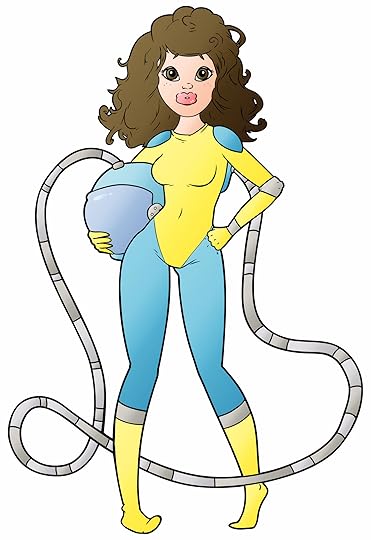 We went past the main lifts, into a small alley like the approach to the café, only this one was better lit. There was a small lift tucked away in a corner and Terri used a plastic card to open the door.
We went past the main lifts, into a small alley like the approach to the café, only this one was better lit. There was a small lift tucked away in a corner and Terri used a plastic card to open the door.
“This is the secure lift; you need a card to open it. It’s the only way to get to some of the working areas. Stay close to me.” She pressed a button and we rose quickly, my knees sagged and my ears popped. The numbers rolled back to zero. “This is the observatory. There’s a lot of expensive gear up here; please don’t touch anything.”
The trouble was, I knew from past experience that the harder that I tried to keep away the more I would somehow be dragged closer. It was like a magnet of embarrassing clumsiness. Telling me not to touch something was like asking me to break it in the most improbable and non-repairable way that I could.
We arrived and stepped out; there was a flight of steps leading up. It got darker as we climbed in a spiral and I stumbled in the dark, grabbing the handrail for support.
“Why is it getting darker,” I asked. “It helps your vision adjust,” Terri whispered. As I reached the top and looked around, I almost forgot to breathe.
The ceiling of the observatory was transparent. Everything above desk height was see-through. There were banks of computers on low desks but otherwise the view was uninterrupted. And what a view! I felt like I was perched at the centre of the universe. Were there really that many stars? Saturn was over to one side and our sun, no more than a bright tennis ball, was away in the other direction. I could see the planet, the rings and several moons, all floating in front of a backdrop of scattered diamonds.
I stepped over to the glass or whatever it was. Looking down, the bulk of the station lay below me, dark and featureless. It was so much bigger than I had thought, stretching away in all directions, its disc hiding the stars. We were slightly offset from the middle and you couldn’t see over the edge of it. “It’s all painted to absorb light,” Terri explained. “And our telescope is over there.” She pointed to a shape on the edge of the station, articulated like a crane. “We can swing it around from here,” she explained, “and for the bits that the station masks, we have another on the bottom, on the opposite side.”
Lou was working on a large flat table, lit from inside, she had what looked like X-ray plates laid out and was peering at them through a large, brass framed magnifying glass on a stalk.
“Hi, Andi,” she said, standing up and rubbing her back. “Bloody table’s built for short people… Oops, sorry.”
Behind me Terri giggled and then stopped abruptly. We couldn’t all be tall and graceful like them. I was used to it. I pretended not to notice; anyway, there was no malice in her voice.
“Why do you look at the pictures with a magnifying glass,” I asked, “when you have all these computers to analyse things?” I stood as far as I could from everything, trying to keep my hands by my sides, fighting the urge to touch something, anything!
“They’re not as sensitive as an eye,” she said. “And there are so many things to programme in to make sure they do it properly. We don’t miss as much as they do, and we do it quicker.”
“They analyse the bits we spot,” added Terri. “Once we tell them where to look.” The two of them bent over a picture and started talking in a foreign language, all red-shifts and quasars or something.
As my vision adjusted I could make out quite a few other people in the room, working at computers or just looking out at the view. But I suspect they would say they were studying things. There was an air of studious calm that I couldn’t quite adjust to, hence my present occupation, important though it was. I’d never been academic, I was never able to shut up and concentrate for long enough to work out what the teacher was going on about. But here, I felt like I understood completely, I was a part of all that I could see. I almost wanted to step outside and just… belong. Fortunately there wasn’t a door; I’d have been opening it.
Seeing Lou and Terri work made me realise just what an act the whole twins thing was, here they were in their element, single minded and professional. They ignored me and carried on with their technical discussion, that was OK though, I could have stood here forever.
“Andi, sorry, we got lost there,” said Terri, after what might have been a few moments or may have been a lot longer. I had no idea and wasn’t bothered. You could see just how contrived time was here. “Let’s go down to the farm, there’s a lot more to see.”
“Can I come back up here again?” I asked in a whisper, like you did in church, somehow it didn’t seem appropriate to talk loudly. “I’ve never seen anything like it.”
“We don’t notice,” said Lou. “It’s all familiar, you can come up with one of us, just ask. But you’ll soon get bored with it.” I didn’t agree, after London and the enclosed spaces I’d been in, this was freedom. This was what I had run to find, I knew it then. The memory of Tina offering us a trip in a mining craft even interested me.
We got back into the lift and went down two floors. We got out of the lift and walked back down an alley to an open space similar to the one on our own deck.
“Every deck has the same basic layout,” Terri explained. “We’re back at the main lifts.”
Opposite the lift was an airlock. I knew that because there were big signs that said ‘Warning, Airlock!’.
“Where are we going now?” I asked as she typed in a code. The door opened and we walked in. Didn’t we need spacesuits or something if we were going out of an airlock? Maybe they were inside. The outer doors closed behind us with a clang. The space was empty, just a metal box. I was about to ask what was going on when there was a hiss and a flash of red light. I felt my face and body being sprayed with a sweet smelling chemical, like hairspray. I jumped, it was cold, and then it evaporated in a blast of warm air. “Don’t worry,” Terri reassured me. “It’s just disinfectant, you’ll see.”
“We’re not going outside are we?” I tried not to sound worried. “Of course not,” she said as the door opened and I stepped into a sight I never thought I’d see again.
~~~~
Both Andorra Pett stories are available from Amazon, the links are in the titles. The third book will be out as soon as I can get to finish it.
Next week, I’ll move on to last year, 2017. The NaNo project for that year was based on a dream I had, a long time ago, it’s not published yet but will be out in March 2019, if it all goes to plan.
If you missed last weeks post, about NaNoWriMo in 2014 you can find it by clicking here.
Meanwhile, the Showcase will return on Thursday.
If you’re attempting NaNo this year, I hope it’s going really well, just remember, you’re nearly halfway. Even if you don’t think you’ll finish, keep writing.
The post The second Monday of NaNoWriMo appeared first on Welcome to my Worlds..
November 7, 2018
The Indie Showcase presents, Glenda Barnett.
This week, it’s my pleasure to introduce another great Indie author. Please welcome Glenda Barnett.
Hello, I’m Glenda Barnett, I think I must have been born with my love of reading, both my parents were avid readers. By the age of four I was reading and writing and I’ve kept going ever since.
I’m sure I’m not alone in finding everyday people and life funny and I mean that in a positive way. I’m not sure that us humans can cope with the constant bombardment of awful news on our phones, the telly, radio ect., on a daily basis, we need to some escape and laughter to balance it out.
So you’re probably not surprised to know I write humorous stories about the people and their lives in a small North Devon village called St Urith With Well.
Previously my writing has been comedy scripts for performance. I also write and direct a village pantomime every year which is an absolute joy and a truly all-inclusive community event. The actors range from four to ninety-two and every year there are some who have never set foot on a stage.
My blog ‘Celia Ladygarden – Trimming the Bush of Life’ has been going for five years now and to my astonishment is read in over eighty different countries. I’m unsure as to how the humour translates in Uzbekistan but I love the fact that women are reading it in such faraway places as India and Saudi Arabia as well as the rest of the world.
A couple of years ago the Open University offered an eight-week creative writing course. I found it extremely useful especially with editing my work and I recommend it to new writers.
Then my son suggested I write a ‘Celia’ book and although I wasn’t sure if I was capable of doing so, I found that I could and what’s more I loved it. I published ‘The Curious Curiosity’ a Celia Ladygarden murder mystery in January 2017. Followed by a collection of short stories ‘Little Red and Other Stories’ in September 2018.
Notebooks, I am addicted to them and struggle to limit my purchase of the things, they are one of the simplest but most useful tools for a writer. I carry one with me always and tend to jot things down constantly. Snatches of conversation, people’s descriptions anything I find interesting or amusing.
With my latest book, I think I’m getting the hang of this writing lark, I tried to be a little more organised but it’s difficult when you’re characters boss you around. As the writer, I have an idea for a story and I start to write it but then the characters, who to me are real and I can clearly see them, start to talk. They have their own ideas as to what’s happening and it seems it’s my job to write it all down. I get sidetracked when they tell me their backstory and sometimes I’m in danger of leading the reader astray. So then I have to edit some of this out because it’s not always relevant to the plot but I keep it and it might pop up in another book. My biggest problem is getting my characters to stop talking! Is this normal for other writers?
My next book Celia Finds an Angel, I am thrilled to announce, will be published shortly. It is to be followed by four more St Urith With Well Capers.
Abridged Excerpt from ‘The Curious Curiosity’:
“This is the most excitement since Mr Mc Loosely was a guest at our WI.”
“Goodness really? What on earth was his talk about?” Asked Claire.
“He gave us a talk about surviving in the wild. It was all a bit boring until he was telling us how to forage for food, when Marjorie Phipps who quite frankly Claire could survive on her own excess body fat for at least three months….”
“That’s a bit harsh Aunty Pat.”
“But true Claire. Anyway on the pretext of going to the toilet she nose-dived into the tuna vol-au-vents and cut rounds. Irene Ingles, madam chairperson was furious and started to get up to go and stop her. The other ladies who hadn’t really been listening to Mr Mc Loosely, started to rise up out of their seats, thinking the talk was over and not wanting to miss the food.
Mr Mc Loosely realised he was losing his audience, picked up two sticks and loudly banged them together shouting ‘LET’S MAKE FIRE!’
The shout woke Wendy who was asleep in the front row, she launched her bottle of elderflower water all over Mr Mc Loosely whose linen trousers went completely transparent. This stopped the stampede to the buffet in its tracks as we all realised Mr Mc Loosely went commando. It was the most exciting talk we’ve ever had at the WI. Throw you’re blue light on the roof love and I’ll put me foot down.”
“I haven’t got a blue light Aunty Pat.”
“Starsky and Hutch always had a blue light! The Sweeney always had a blue light! You’re the police you must have a blue light !”
~~~~
Abridged Excerpt from ‘Celia Finds an Angel”
“Sounds like the air ambulance Ronald.” Celia said.
It’s coming this way, better get out there with the lights just in case,” said Ronald.
As fast as they could manage they hurried around to the playing field. There were quite a few people already there when they arrived, including Betty, Dusty and Lilac. Willie arrived with his eggshell candelabra lantern. He’d obviously come out in a hurry because all he was wearing, apart from a tombstone grin, was a grubby set of long Johns of indeterminate colour. The bottoms were predictably held up with baler twine and one unwanted sleeve was attached to Willie’s head like a surreal nightcap. Fred came along just behind Willie and soon there was a circle of light around the landing spot.
~~~~
I’ve been delighted to have some great 5* reviews, I hope you enjoy reading my books.
Many thanks to Richard for gifting me this showcase.
Books available through Amazon as ebooks or paperback.
https://www.amazon.com/author/glendabarnett https://www.celialadygarden.com
Twitter https://twitter.com/celialadygarden Facebook https://facebook.com/glendabarnettauthor
~~~~
Thanks, Glenda, for a great post. I hope you all enjoyed it.
While you’re here, why not have a look around the site? There are FREE things and a whole lot more, just follow the links at the top of the page.
If you want to be featured in a future Showcase, where you can write about whatever (within reason) you want, then please let me know. Use the comment box below and I’ll get back to you.
You can catch up on previous Showcase posts by clicking HERE
Don’t miss next Thursdays Showcase post, and my musings every Monday.
Have a great week,
Richard.
The post The Indie Showcase presents, Glenda Barnett. appeared first on Welcome to my Worlds..
November 4, 2018
The first Monday of NaNoWriMo
 As it’s November and I’m busy trying to complete NaNoWriMo for the fourth time; I thought that it would be a good idea to show you some extracts from previous years NaNo projects. I actually wrote all this months posts back in August, so I would have a clear schedule for the challenge.
As it’s November and I’m busy trying to complete NaNoWriMo for the fourth time; I thought that it would be a good idea to show you some extracts from previous years NaNo projects. I actually wrote all this months posts back in August, so I would have a clear schedule for the challenge.
So, we’ll start with 2014, my first year of participation. I was still employed as a pilot by the Port of London Authority, but I was on sick leave, having hurt my shoulder. In fact, I had an 8mm bone spur in the joint, which prevented movement of my arm. I was later to have surgery on the joint to remove it. I didn’t know it at the time but my career was over. I’d already self-published one novel, Freefall and was thinking of writing a second. I saw an article about NaNoWriMo online somewhere, it seemed like an interesting premise and a good way of concentrating my efforts.
With time on my hands and an idea in my head, I wrote the first draft of Ribbonworld, just over 60,000 words in the month, it was finished enough to send it out to a few people I trusted, to get honest opinions. Their comments were encouraging, so I rewrote it using some of the suggestions I got back, along with the things that I wanted to change. In the end, it came in at just over 70,000 words.
One of the best responses I got was from Helen Hollick, an author who I dared to ask the opinion of.
She said,
Well now I’m going to be blunt and firm, since you asked.
You want the truth? You did ask for the truth.
I don’t quite know how to put this but I’m not very impressed with you Richard.
You do realise I have now spent over an hour reading your bloomin brilliant book, and not getting on with my own work, don’t you? LOL
I rarely like first person, the exception is Dick Francis. I usually struggle with first person because the story often comes out as ‘tell not show’ – but I was hooked into yours straight away. I was there in that (Premier Inn / Travelodge) room – I’ll now never go into another without checking the bathroom first! It has pace, impact, interest… I want to read more ”
Is this a one-off or are you planning a series? I hope a series… this has potential!
That was the thing that encouraged me to carry on, Freefall had been out for a while and was not selling very well. If I had received a more negative reaction to Ribbonworld than positive, I was contemplating giving up.
So here’s an extract from Ribbonworld. As Helen referred to the bathroom in her email, we’ll start there. Our hero has arrived in his hotel room but can’t get the bathroom door open. He’s called room service and fallen asleep while waiting.
~~~~
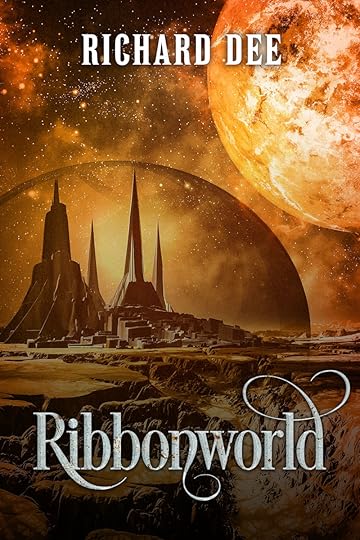 The door buzzer woke me with a jolt. Looking at my watch I saw that I had been asleep for almost an hour. “Coming,” I called, thinking it must be the repair man. I was feeling a bit disorientated from the dream so I didn’t look through the spyhole, I just pushed the lock release by the door and stood back.
The door buzzer woke me with a jolt. Looking at my watch I saw that I had been asleep for almost an hour. “Coming,” I called, thinking it must be the repair man. I was feeling a bit disorientated from the dream so I didn’t look through the spyhole, I just pushed the lock release by the door and stood back.
The door slid open and there were two of them, in crumpled looking suits and wearing worn expressions. I could tell straight away that they weren’t repair men.
“Who are you?” the taller one said, waving an official-looking card at me. His gaze travelled over my shoulder, taking it all in. I had déjà-vu; this was just like it had been in my dream, and before that in my reality.
“I could ask you the same,” I replied, suddenly very awake.
“We’re the police,” said the second man, shorter and more rotund, with dark hair and a beard, “Detectives Flanagan and Chumna. We got a tip-off.”
I had a sinking feeling. “I didn’t call you, I called the desk – I can’t get the bathroom door open.”
They came into the room as I backed down the corridor; the one called Flanagan took a small multi-driver from his inside pocket and levered open the control panel for the room electronics. He fiddled around for a while, and the bathroom door started to slide open. When it reached the obstruction, it didn’t shut; it stopped with a six-inch gap.
The motor kept whirring as the two detectives put latex gloves on and held the edge of the door. They both pulled, grunting with the effort. Whatever was in there wasn’t giving up easily. Slowly the door slid open until Chumna was able to squeeze through the gap. He disappeared. There was a dragging sound and the door opened fully.
The light came on, just as he called out, “Barry, get in here.”
Flanagan disappeared into the room. “Don’t come in,” he called to me over his shoulder. Fair enough, but by going to the open door I could see what was going on in the mirror. And I was still enough of a journalist to be nosey.
A man’s body was lying in the shower stall, with one leg flung out against the door. He was about my size, early middle aged and muscular, his flesh slackened in death.
There was no blood, or obvious wound, but as my gaze travelled over his body, I saw that the neck was mottled with blue and black bruises, below light stubble.
His eyes held my gaze, open wide, bulging from the skull and staring ahead in a shocked expression. The tongue had swollen up and forced the lips into a cross between a grin and a snarl. The detectives turned the body, patting the pockets, and Chumna pulled a wallet from one of them. I could see that it was full of paper money. He extracted an ID card and held it up to the face. The two exchanged knowing glances. One of them called out to me, “Do you know someone called Nic Stavriedies?”
That could be difficult to explain. I sort of did, but until I knew a bit more about the situation that I found myself in, I didn’t feel happy admitting it. So I said nothing.
They both emerged from the bathroom. “Who did you say you were?” said the tall one.
“I didn’t. I’m Miles Goram and I’ve only just got here.”
He consulted his notebook, nodding.
“That’s what it says here,” he said, “but you haven’t answered me, do you know him?”
“I know who he is, was, but I’ve never met him before, only talked to him, that’s why I’m here.”
“And why are you here?” This came from the short one, Chumna or whatever it was.
“I’m a writer, and I was supposed to be doing a piece about Nic Stavriedies and his hotel.”
~~~~
I hope you enjoyed that, Ribbonworld is available from all major ebook sellers, at the moment, it’s absolutely FREE. That will be changing soon, so if you’ve enjoyed the extract, grab a copy for the full story. And if you do read it, please leave a review.
Next week, I’ll be telling you about my 2016 NaNo project, which turned out to be a step in a completely different direction.
Meanwhile, the Showcase will return on Thursday. If you’re attempting NaNo this year, I hope it’s going well.
In case you’re interested, my word count so far this year is
The post The first Monday of NaNoWriMo appeared first on Welcome to my Worlds..

